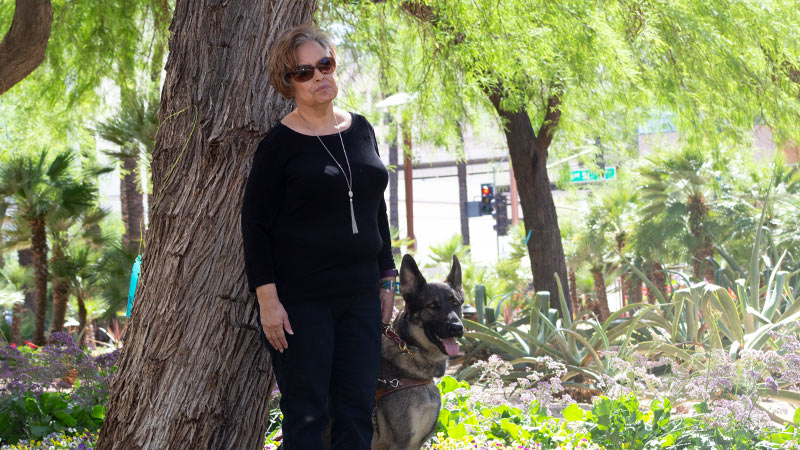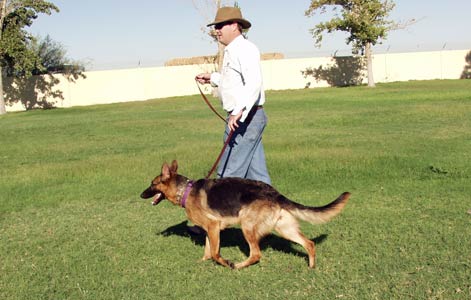Our Program
Our program matches trained guide dogs with visually impaired individuals at no charge to the recipient.
Welcome
Thank you for your interest in the Eye Dog Foundation. We are a non-profit organization dedicated to matching trained guide dogs with visually impaired individuals at no charge to the recipient. Our nearly 5-acre grounds accommodate the historic home, dormitory, kennel, and garage. We also have dedicated puppy kennels. Grass training field and desert landscaped walking paths provide safe places for exercise and practice. Classes are held between November and the end of March. Classes are limited to six students.

Our Program
Once ready, the dogs are matched with blind students to begin a life with a new best friend. An experienced instructor and assistant trainer accompany the students on training walks as they become acquainted with their new traveling partner.
Two outings per day and obedience workouts several times each week help students and dogs form the bond of a working team. Lectures in the evenings provide a forum for questions and give the students a chance to discuss the day’s training with the instructor. Free time is spent relaxing with classmates and preparing for a new day of training.
Sundays are a day of welcome rest and a chance for friends and family to visit our school.
As training progresses, a team begins to take shape. The student becomes the dog’s new master. Providing daily care and grooming, they take the place of the trainer in the heart of the dog. The relationship grows as the blind person and their new companion learn to master rural travel, busy downtown areas, and hectic shopping malls.
Training in a variety of environments helps prepare students for the many challenges they will face in their everyday travels.
Well kept grounds offer paved walkways and a wide-open grassy area for training. In addition, we offer a canine confidence course, desert walkway, and a safe intersection for training purposes.
How to Apply
The first step for a person interested in obtaining a dog from the Eye Dog Foundation is to request and submit an application. In the student service section of this site, there is a short request for an application that may be completed and submitted online. You may also call 1-800-393-3641 and request an application.
Necessary Qualifications
Previous Eye Dog graduates have priority when a replacement dog is needed. Applicants must be at least eighteen years of age and have successfully completed an orientation and mobility program. Each application returned is evaluated on an individual basis.
Secondly, it is important to know that each person is able to benefit from the use of a guide dog. Good travel skills are one of the keys to successful travel with a guide dog. Completing an orientation and mobility course is mandatory. Spending time polishing the skills gained in the O&M course will benefit the student greatly when switching to another type of mobility aid, namely the dog. Although the dogs at times do things that are pretty amazing, they are not magical.
In addition, a person must be capable physically, mentally, and emotionally to complete class and maintain and utilize the dog when they return home. Each person must also be able to provide a safe, healthy home, and quality care for their dog. A basic guideline of $50 per month for maintenance and $200 yearly for vet care is a good place to start.
References are checked and interviews are conducted with each student. Arizona residents are visited in person. Applicants from other states are interviewed by phone and a video is usually requested to help the training staff get a better idea about each person and their particular work environment. History with previous guide dogs is especially important, as is a performance in other training programs.
To help with matching the student to the right dog, Eye Dog Foundation requests a video of each applicant using a cane independently in a known area to include a lighted street crossing, a video of the student walking sighted guide at a comfortable pace to demonstrate the speed with which the student travels. Generally, people walk a little faster with a dog but remember it should be a comfortable pace and not the fastest pace you can walk at. Another thing that is helpful is pictures/videos of areas the student frequently walks.
In order to successfully use a guide dog, a person must accept the responsibilities of the handler. These include day to day care of the dog as well as the maintenance and future training of a highly skilled working animal. A great deal of emphasis is placed on this concept, during the training course.
Orientation
Applicants selected for training will be notified by letter and phone. Eye Dog Foundation does not provide travel services to and from your home or airport. We do provide service to and from Sky Harbor airport in Phoenix and the Eye Dog Foundation campus.
Student Needs
Students’ needs while in class are fairly simple. All medications should be brought in sufficient supply to last the entire class. Personal snack items can be purchased by students and stored in the dorm refrigerator.
As initially mentioned, there is no cost to the students for the dog or any of the services provided by the Eye Dog Foundation. Therefore, students should only bring as much personal spending money as they feel comfortable securing on their own.
The dress code is casual. A good pair of well broke-in walking shoes is a must, two is better. Temperature can vary considerably, 40 degree winter nights, and 90+ degree spring and fall days are quite common.
Training Facility and Schedule
After arriving at the foundation and getting unpacked, students have the afternoon and evening of the first day to get to know one another. Usually, all students arrive on Sunday of the first week. Work begins Monday morning with an orientation tour. Afterward, students and trainers gather again in the dormitory to discuss class routines, basic rules, dormitory layout, and any other first day concerns. A review of each student’s application allows the staff to confirm any special medical or dietary needs.
The dormitory contains 6 individual rooms, each with their own bathroom. A living room in the center of the dorm includes a refrigerator, sink, and a TV with VCR, as well as a recently donated descriptive video library. A payphone is available for student use. A large dining room provides plenty of room for 6 students with dogs. Meals are provided near the training route.
A relief area for the dogs is directly accessible from the south side of the dormitory. On the opposite side of the dorm, a patio with chairs and a table accommodates those wishing to relax outside. It also doubles as the designated smoking area, leaving the dormitory smoke free.
The class routine is based on two workouts daily, Monday through Saturday. A typical day begins around 6 AM with breakfast provided near the training route. After breakfast, we will depart for training around 8:30 AM. Most training locations are no more than 30 to 40 minutes from the center, so work is generally started at 9 AM. Lunch is scheduled at noon. We return to the center after lunch to allow time for attending to canine and personal needs. The afternoon session will start at approximately 1:30 PM. We return around 4 PM to the center to give students time to freshen up before going to dinner. We head out to dinner between 5:30 PM and 6 PM.
Group discussions are held 2-3 times per week, usually in the evenings. Here, new training concepts are introduced and earlier training sessions are reviewed. Patience, humility and a good sense of humor are essential. Other questions relating to dogs such as general care and problem-solving are often topics for lively debate.
Most students adapt quickly to the routine and begin to look for ways to fill up the free time. Utilizing the training field and walking paths to practice is highly recommended.
Handler Training
As mentioned earlier, there is a lot of focus on the handler’s skills and responsibilities. The dog is operating in our world, not the other way around. This is something that can be used to the handler’s advantage, but it presents an obligation as well. Because we are the ones with the ability to plan and analyze, each student must learn to accept responsibility for all aspects of owning and working a guide dog.
Each handler must use their skills together with those of their dog.
The student will follow the same general path in training as the dog did, only at an accelerated pace. Obedience workouts begin the bonding process, followed by easy walks to allow dogs and new masters to adjust to each other. Like their dogs, students learn at their pace. The small class size allows considerable flexibility in the design of each student’s instruction program. Each student is treated as an individual and a separate teaching plan developed to meet the needs of you and your dog. The goal is to help each person learn to use their dog to increase their ability to travel safely and effectively in today’s busy world.
At first, each student works one on one with an instructor, developing the basic skills necessary for using a guide dog. Different work areas call for new techniques. As each student progresses, routes become longer and more complicated. Supervision is gradually reduced as students become more comfortable with their dogs.
Workouts continue to become more challenging as teams grow in their capabilities. Obedience workouts in puppy class with 20 or more future guide dogs, builds the student’s confidence in their dog’s stability and control. Working independently under only light supervision in the later stages of class lets the team develop their own style and cements the bond between student and dog. They learn to work together and help each other to overcome the challenges the training team puts together.
Graduation Requirements
While each student is treated as an individual, the standard for graduation remains the same for all. Each student must demonstrate the ability to travel safely and effectively. They must also demonstrate by their overall handling and treatment of their dog that they will continue to fulfill their responsibilities as the owner and handler of a very special dog.

More Information
Thank you again for your interest in the Eye Dog Foundation. Persons interested in obtaining more information about the Eye Dog Foundation may call the toll free number at any time. 1-800-EYE-DOG-1. That translates to 1-800-393-3641. Please fill out the Application Request Form to request an application to the program.

